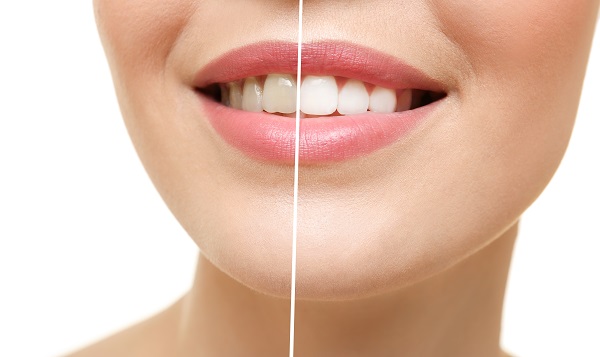Should I Have My Teeth Cleaned Before Professional Teeth Whitening?

Getting your teeth cleaned before your professional teeth whitening treatment is typically recommended by dentists. Whitening treatments are performed to restore teeth to their original color or to make them whiter than they have ever been.
Professional teeth whitening treatments are performed using highly concentrated bleaching agents that penetrate teeth enamel and reach the inner layers of teeth. It is an effective way to eliminate deep and surface stains from teeth.
Teeth are prone to becoming stained, regardless of how well a person takes care of their mouth, due to habits like smoking, drinking coffee and eating foods with strong coloring agents, like pasta sauce.
Getting teeth cleaned before professional whitening treatments
Having your teeth cleaned before teeth whitening often leads to even whitening and improved results. Here are the reasons that a dentist might recommend teeth cleaning prior to whitening a patient's teeth.
1. Gets rid of food particles in the mouth
Cleaning before a professional teeth whitening treatment helps remove food debris left on teeth surfaces and the tight spaces between teeth after meals. Such debris can block areas they cover from being whitened, leading to uneven results.
2. Removes plaque and tartar
Brushing and flossing can help remove food particles and plaque from teeth surfaces, but it does not do much once plaque calcifies and turns into tartar. Tartar is typically removed with a tool known as a scaler during teeth cleaning treatments performed by dentists.
Tartar leads to the discoloration of teeth surfaces and makes them more prone to staining. It can also prevent the bleaching agent used during whitening treatments from properly coating teeth surfaces, reducing the effectiveness of the patient's whitening session.
3. Removes stains
Teeth cleaning does not whiten the color of a patient's teeth, but it is an effective way to remove surface stains. Tartar is more prone to staining than teeth enamel, so teeth that are covered with tartar are typically covered with stains. Removing these surface stains can improve the aesthetics of the patient's teeth and lead to improved whitening.
4. Helps spot cavities and other signs of tooth decay
Dentists get a close-up look at a patient's teeth during teeth cleanings, and they sometimes spot dental issues like tooth decay and gum disease during these cleanings. The bleaching agents used for teeth cleaning tend to weaken teeth and can cause pain and irritation when the patient has existing dental issues. At times, teeth whitening treatments can cause permanent damage to teeth that were already compromised prior to the patient's treatment.
5. Leads to better results
Removing food particles, plaque, tartar and existing surface stains leads to more effective whitening treatments. Many patients who have their teeth cleaned before their whitening treatments are happy with the results after a single treatment.
Whitening treatments can lead to an improved smile
There is no need to be unsatisfied with the appearance of your teeth when all it could take to improve their appearance is a teeth cleaning followed by a professional whitening treatment. Call or visit our Stoughton clinic to start the process.
Request an appointment here: https://dentistryonpark.com or call Dentistry on Park, LLC at (781) 443-8131 for an appointment in our Stoughton office.
Check out what others are saying about our services on Yelp: Read our Yelp reviews.
Recent Posts
Tooth extraction may become necessary when a tooth no longer functions or contributes to oral health. A general dentist uses a range of tools and techniques to safely remove the tooth while protecting nearby structures. They may recommend extractions for reasons such as dental trauma, crowding, severe decay, or infection that has reached the tooth's…
There are many options for replacing missing teeth, but how can replacing missing teeth help your oral health? Replacing missing teeth is the best way to prevent tooth decay, gum disease, and jawbone deterioration. Options for replacing missing teeth are dental implants, dentures, or dental bridges. Choosing which option will work best for you depends…
Nobody wants to be searching for options for replacing missing teeth, but it’s good to be prepared just in case. Not only is a missing tooth an eyesore, but there is usually an underlying reason behind it. Mouth diseases such as gingivitis or accidents are generally the most likely culprits for losing a tooth. No…
It is amazing the amount of confidence that comes from the options for replacing missing teeth. The absence of a tooth or even multiple teeth can make daily tasks like eating and speaking more difficult than they must be. For those who suffer from this, just having the ability to learn more about options can…


